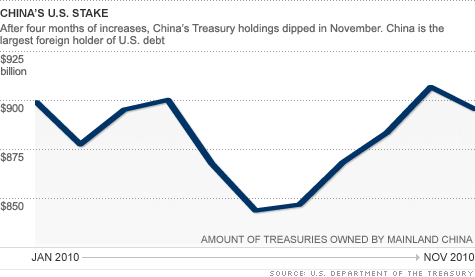China: The new landlord of the U.S.

NEW YORK (CNNMoney) -- If you owed somebody a lot of money, let's say for the sake of argument nearly $900 billion, you probably wouldn't want to make this creditor angry, right?
Tell that to President Obama, Treasury Secretary Tim Geithner and several members of Congress.
China is the largest foreign holder of U.S. debt. Despite this fact, many politicians are talking tough (perhaps tougher than they should be) about China's artificially low currency and how that affects trade relations between the two world powers.
With China President Hu Jintao now visiting the United States and set to meet Obama at the White House Wednesday, it seems likely that the topic of the undervalued yuan will come up.
Hopefully though, Obama will be more diplomatic than those who are calling for the U.S. to crack down even more on China for its currency manipulation. Let's face it. China is kind of like our landlord. Or, if you prefer a more menacing term, our loan shark. We should tread carefully.
The Treasury Department reported Tuesday that China owned $895.6 billion in U.S. bonds as of November. That's down from $906.8 billion a month earlier and is the first decline in China's holdings since June.
This is noteworthy because China has been vocal about its disapproval of the Federal Reserve's bond buying program, a policy known as quantitative easing. The Fed unveiled plans to buy $600 billion in long-term Treasuries in November. This is the second such program, hence the nickname QE2.
China is understandably alarmed since the Fed's bond buying should lead to a weaker dollar and higher interest rates, thus reducing the value of China's Treasury stake. It would not be a stretch to make the argument that QE2 is in of itself, a blatant act of currency manipulation.
Guy LeBas, chief fixed income strategist with Janney Montgomery Scott in Philadelphia, said that the decline in China's Treasury holdings is significant and that it could be the beginning of a long-term trend. China, seeking to diversify its central bank's debt holdings, may increasingly shift to euro-zone bonds, LeBas said.
With that in mind, LeBas said he thinks some of the political rhetoric regarding currency and trade does need to be toned down.
"China has been artificially suppressing the yuan for a while. But the U.S. government should be cognizant that China holds a lot of cards," he said.
Kenneth Naehu, managing director and head of fixed income with Bel Air Investment Advisors in Los Angeles, said though that the bigger concern is not that China may start selling. It's that China's demand for Treasuries will wane.
"This is not a mass exodus but there is no doubt that China selling Treasuries should be a concern," Naehu said. "If the U.S. is going to keep issuing so many new Treasuries, who will the buyers be? If China isn't buying, that could put huge upward pressure on interest rates."
Still, others argue that while China does have some leverage over the U.S., it's uncertain if the Chinese really would want to do anything drastic with its bond holdings.Selling a sizeable chunk, after all, is the equivalent of shooting itself in the foot since it could cause rates to go even higher. (Bond prices and yields move in opposite directions.)
"China knows it probably shouldn't do stuff to implode the Treasury market," said Fred Fraenkel, vice chairman of Beacon Trust, an investment firm in Morristown, N.J. "Even if it's upset about QE2, China is not going to create a run on bonds."
There's also the issue of just how much U.S. debt China really owns. The official number reported by the Treasury is just a hair under $900 billion.
But the actual amount could be higher, said Nancy Vanden Houten, an analyst with Stone & McCarthy Research Associates in Princeton, N.J.
That's because it is widely believed that China has used dealers in the United Kingdom to scoop up Treasuries. Those purchases would then show up on the holdings for the U.K., not China.
And while the amount of China's debt holdings are roughly the same now as at the start of 2010, the U.K.'s holdings has surged from $208 billion in January to $511 billion in November.
So as strange as it may seem, the fact that the U.S. is so heavily in hock to China may actually give America a bit of an edge in further economic negotiations.
"There's an old adage," LeBas said. "If the bank lends you a thousand dollars, the bank owns you. But if the bank lends you a million dollars, you own the bank."
SOURCE: http://money.cnn.com/2011/01/18/news/international/thebuzz/index.htm